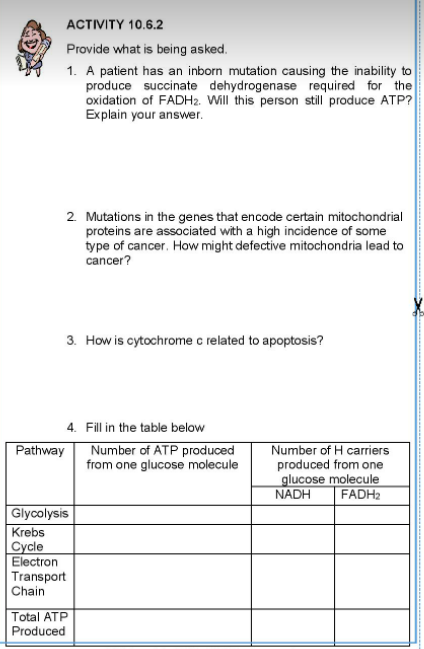1. A patient has an inborn mutation causing the inability to produce succinate dehydrogenase required for the oxidation of FADH2. Will this person still produce ATP? Explain your answer. 2 Mutations in the genes that encode certain mitochondrial proteins are associated with a high incidence of some type of cancer. How might defective mitochondria lead to cancer? 3. How is cytochrome c related to apoptosis? 4. Fill in the table below Number of ATP produced from one glucose molecule Pathway Number of H carriers produced from one glucose molecule NADH FADH2 Glycolysis Krebs Cycle Electron Transport Chain Total ATP Produced
1. A patient has an inborn mutation causing the inability to produce succinate dehydrogenase required for the oxidation of FADH2. Will this person still produce ATP? Explain your answer. 2 Mutations in the genes that encode certain mitochondrial proteins are associated with a high incidence of some type of cancer. How might defective mitochondria lead to cancer? 3. How is cytochrome c related to apoptosis? 4. Fill in the table below Number of ATP produced from one glucose molecule Pathway Number of H carriers produced from one glucose molecule NADH FADH2 Glycolysis Krebs Cycle Electron Transport Chain Total ATP Produced
Biochemistry
6th Edition
ISBN:9781305577206
Author:Reginald H. Garrett, Charles M. Grisham
Publisher:Reginald H. Garrett, Charles M. Grisham
Chapter19: The Tricarboxylic Acid Cycle
Section: Chapter Questions
Problem 19P
Related questions
Question

Transcribed Image Text:ACTIVITY 10.6.2
Provide what is being asked.
1. A patient has an inborn mutation causing the inability to
produce succinate dehydrogenase required for the
oxidation of FADH2. Will this person still produce ATP?
Explain your answer.
2 Mutations in the genes that encode certain mitochondrial
proteins are associated with a high incidence of some
type of cancer. How might defective mitochondria lead to
cancer?
3. How is cytochrome c related to apoptosis?
4. Fill in the table below
Pathway
Number of ATP produced
from one glucose molecule
Number of H carriers
produced from one
glucose molecule
NADH
FADH2
Glycolysis
Krebs
Cycle
Electron
Transport
Chain
Total ATP
Produced
Expert Solution
This question has been solved!
Explore an expertly crafted, step-by-step solution for a thorough understanding of key concepts.
This is a popular solution!
Trending now
This is a popular solution!
Step by step
Solved in 2 steps with 1 images

Recommended textbooks for you

Biochemistry
Biochemistry
ISBN:
9781305577206
Author:
Reginald H. Garrett, Charles M. Grisham
Publisher:
Cengage Learning

Biochemistry
Biochemistry
ISBN:
9781305961135
Author:
Mary K. Campbell, Shawn O. Farrell, Owen M. McDougal
Publisher:
Cengage Learning

Biology 2e
Biology
ISBN:
9781947172517
Author:
Matthew Douglas, Jung Choi, Mary Ann Clark
Publisher:
OpenStax

Biochemistry
Biochemistry
ISBN:
9781305577206
Author:
Reginald H. Garrett, Charles M. Grisham
Publisher:
Cengage Learning

Biochemistry
Biochemistry
ISBN:
9781305961135
Author:
Mary K. Campbell, Shawn O. Farrell, Owen M. McDougal
Publisher:
Cengage Learning

Biology 2e
Biology
ISBN:
9781947172517
Author:
Matthew Douglas, Jung Choi, Mary Ann Clark
Publisher:
OpenStax

Anatomy & Physiology
Biology
ISBN:
9781938168130
Author:
Kelly A. Young, James A. Wise, Peter DeSaix, Dean H. Kruse, Brandon Poe, Eddie Johnson, Jody E. Johnson, Oksana Korol, J. Gordon Betts, Mark Womble
Publisher:
OpenStax College